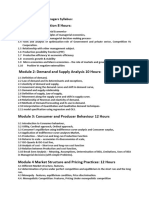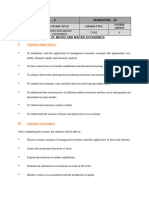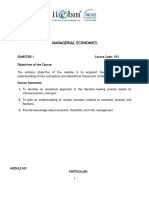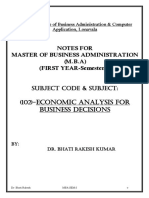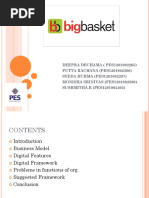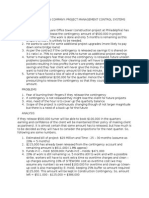MBEV1001
MBEV1001
Uploaded by
binaybarik44Copyright:
Available Formats
MBEV1001
MBEV1001
Uploaded by
binaybarik44Copyright
Available Formats
Share this document
Did you find this document useful?
Is this content inappropriate?
Copyright:
Available Formats
MBEV1001
MBEV1001
Uploaded by
binaybarik44Copyright:
Available Formats
MBEV1001 MANAGERIAL ECONOMICS (3-0-0)
Course Objectives:
1. To lay an adequate theoretical foundation to study various applied fields in
economics and management.
2. To demonstrate the application of economic theory to business decisions.
3. To develop a student’s ability to think analytically about the economic forces at work in
society.
4. To develop a framework which the students may use to analyze the overall behavior
of a modern mixed economy.
Module – I: Relevance of economics for business decisions,Scope of Managerial Economics,
Role of Managerial Economist and Business decision making. Demand Analysis – individual
demand and market demand, Determinants of demand, Elasticity of demand and its measures in
business decision making, Demand Estimation and demand Forecasting, Supply Analysis.
Module – II: Production functions: Short Run Production Function – Variable Proportions, Long
Run Production Function - Returns to Scale; cost minimization and output maximization, various
cost concepts, cost functions, Economies of scale and economies of scope (simple numerical
problems to be solved).
Module-III: Market morphology, price and output determination under different market
conditions: Perfect competition, monopoly, monopolistic competition, oligopoly, Descriptive
pricing approaches: Full cost pricing, product pricing; Price skimming, penetration pricing. Input
pricing; Concepts of consumption, saving, and investment, Phases of business cycle, Inflation,
Fiscal and Monetary policies, National Income.
Course Outcomes:
CO-1: Adopt the managerial economics concepts for business decision making. Also know the law
of demand, its exceptions and the use of different forecasting methods for predicting demand
for various products and services.
CO-2: Analyse the different costs of production and how they affect short and long run decision.
Derive the equilibrium conditions for cost minimization and profit maximization. Analyse
economies of scale, diseconomies of scale and economies of scope.
CO-3: Learn about the short run and long run equilibrium of a firm and industry and also about
different market structure and various pricing techniques.
CO-4: Analyse different phases of business cycle, Analyse the impact of cyclical fluctuation on the
growth of business and lay policies to control business cycle.
Reference Books:
1. Managerial Economics, Geetika, Ghosh, Raychoudhury,TMH
2. Managerial Economics, Salvatre, Srivastava,Oxford
3. Managerial Economics, Keat, Young, Banerjee,Pearson,
4. Managerial Economics, H L Ahuja, S.Chand
5. Managerial Economics Theory and Applications, DM MithaniHPH
6. Managerial Economics, PL Mehta Sultanchand&Co.
7. Managerial Economics, DN. Dwivedi,Vikash
You might also like
- Final Business Plan - .-Energetic - GrahamballDocument18 pagesFinal Business Plan - .-Energetic - GrahamballHart Franada80% (10)
- Economic Analysis For Business DecisionsDocument6 pagesEconomic Analysis For Business DecisionsG NagarajanNo ratings yet
- ECON 101 Basic MicroeconomicsDocument95 pagesECON 101 Basic MicroeconomicsJunnel RamosNo ratings yet
- Iso 9001 2015Document54 pagesIso 9001 2015qajjepl100% (15)
- FT I Manag EcoDocument3 pagesFT I Manag EcoKavyaNo ratings yet
- ME SyllubusDocument3 pagesME SyllubusR16 1859 GOLLA PUJARI SHIRISHANo ratings yet
- Business Economics-Sem-II-Study MaterialDocument195 pagesBusiness Economics-Sem-II-Study MaterialSHREY ffNo ratings yet
- Economics For Managers MODULE 1Document35 pagesEconomics For Managers MODULE 1SUPRITH SREENo ratings yet
- M.comDocument37 pagesM.comTHE MANAGEMENT CONSORTIUM (TMC) ‘All for knowledge, and knowledge for all’No ratings yet
- Befa Notes For Mid-IDocument18 pagesBefa Notes For Mid-IChandu GantalaNo ratings yet
- Economic Analysis For BusinessDocument89 pagesEconomic Analysis For BusinessDr. Rakesh BhatiNo ratings yet
- Chapter 1 Micro EconomicsDocument15 pagesChapter 1 Micro EconomicsIsmith PokhrelNo ratings yet
- H11EB-rebrandDocument10 pagesH11EB-rebrandzamirNo ratings yet
- Business EconomicsDocument56 pagesBusiness EconomicsM RAMESHNo ratings yet
- Managerial EconomicsDocument301 pagesManagerial Economicsvandanakanala76No ratings yet
- Economics - SyllabusDocument1 pageEconomics - SyllabusAnuraj KrNo ratings yet
- ECONOMICS Pallavi 12Document9 pagesECONOMICS Pallavi 12pratimasingh3049No ratings yet
- EFM College NotesDocument178 pagesEFM College Notesrahul100% (1)
- Characteristics of Business Economics1Document6 pagesCharacteristics of Business Economics1ihavenoidea33100% (1)
- Unit 1: Meaning and Definitions of Business EconomicsDocument31 pagesUnit 1: Meaning and Definitions of Business EconomicsShairlee GuptaNo ratings yet
- 5 0 0 FinalDocument213 pages5 0 0 FinalPankaj MehtaNo ratings yet
- Unit - 1 Ugc Net Management: Easynotes4UDocument27 pagesUnit - 1 Ugc Net Management: Easynotes4UAbirami DurairajanNo ratings yet
- TM - PGDM - 103 - MeDocument39 pagesTM - PGDM - 103 - Mebitunmou100% (1)
- Managerial Economics NotesDocument7 pagesManagerial Economics NotesViraja Guru67% (3)
- Micro Economics LW1117Document7 pagesMicro Economics LW1117orinluna03No ratings yet
- Course Code: ECO 101 2. Course Title: Managerial EconomicsDocument6 pagesCourse Code: ECO 101 2. Course Title: Managerial EconomicsNaresh HariyaniNo ratings yet
- Course Syllabus: MBA 135 Managerial Economics 2 Credits Course DescriptionDocument3 pagesCourse Syllabus: MBA 135 Managerial Economics 2 Credits Course DescriptionMathew JoseNo ratings yet
- ECONOMICSDocument3 pagesECONOMICSSwiti JadhavNo ratings yet
- Business Economics - Code - 107 (BBA-G.& BBA-B&I) - Sem. I 2Document152 pagesBusiness Economics - Code - 107 (BBA-G.& BBA-B&I) - Sem. I 2ashutoshrahi02100% (1)
- Me Bba 1ST SemDocument266 pagesMe Bba 1ST SemFarrah Malik100% (1)
- BA 4103 EconomicsDocument298 pagesBA 4103 EconomicsDEAN RESEARCH AND DEVELOPMENTNo ratings yet
- MME TLPDocument4 pagesMME TLPsatayamkatareNo ratings yet
- Managerial EconomicsDocument193 pagesManagerial EconomicsRambabu UndabatlaNo ratings yet
- Managerial EconomicsDocument8 pagesManagerial EconomicsTarun PantNo ratings yet
- SyllabusDocument2 pagesSyllabusthakkar.family24No ratings yet
- B Com I (Business - Economics)Document5 pagesB Com I (Business - Economics)Pooja RajputNo ratings yet
- Syllabus - Economics - IDocument8 pagesSyllabus - Economics - IBoiled PotatoNo ratings yet
- Managerial Economics LOLP For PGDM 2013-15 by Pankaj KumarDocument4 pagesManagerial Economics LOLP For PGDM 2013-15 by Pankaj KumarRaja ßalaNo ratings yet
- 212 B.Eco Ans DiaryDocument59 pages212 B.Eco Ans DiaryYadav RahulNo ratings yet
- MEFA - 1st UnitDocument22 pagesMEFA - 1st Unitshaikshaikkarimulla43No ratings yet
- Micro EcoDocument2 pagesMicro Ecovivekgarg33.vgNo ratings yet
- Paper 4A Business EconomicsDocument116 pagesPaper 4A Business Economicssowjanya250789No ratings yet
- Subject: Course: MBADocument169 pagesSubject: Course: MBAAnonymous d3CGBMzNo ratings yet
- B. Tech Sem - I SUBJECT-Engineering Economics and Principles of Management (AM110) Teaching Scheme (Hr/week) Exam Scheme (Marks)Document3 pagesB. Tech Sem - I SUBJECT-Engineering Economics and Principles of Management (AM110) Teaching Scheme (Hr/week) Exam Scheme (Marks)jay bhagatNo ratings yet
- Course Outline Dec 2019Document2 pagesCourse Outline Dec 2019Abdul MajeedNo ratings yet
- Eco ImpDocument251 pagesEco Impsrikanth20224No ratings yet
- Managerial Economics & Financial AnalysisDocument125 pagesManagerial Economics & Financial AnalysisSandeep RawatNo ratings yet
- BEFADocument2 pagesBEFAdva999770% (1)
- Managerial Economics - 103Document4 pagesManagerial Economics - 103Devasish KumarNo ratings yet
- Unit 1 MEDocument24 pagesUnit 1 ME11priyagargNo ratings yet
- 102 EABD CourseNoteDocument55 pages102 EABD CourseNoteDr. Rakesh BhatiNo ratings yet
- Mastering Financial Analysis: Techniques and Strategies for Financial Professionals: Expert Advice for Professionals: A Series on Industry-Specific Guidance, #1From EverandMastering Financial Analysis: Techniques and Strategies for Financial Professionals: Expert Advice for Professionals: A Series on Industry-Specific Guidance, #1No ratings yet
- Industrial Project Management Decoded: Things I Wish My Boss Would Have Told MeFrom EverandIndustrial Project Management Decoded: Things I Wish My Boss Would Have Told MeNo ratings yet
- Macroeconomics made simple, investing by interpreting the financial markets: How to read the financial markets in order to invest with greater awarenessFrom EverandMacroeconomics made simple, investing by interpreting the financial markets: How to read the financial markets in order to invest with greater awarenessNo ratings yet
- Transforming Business for Good: A Comprehensive Guide to Innovation, Ethics, and Data Analysis: Understanding Money: Finance and Economics Simplified, #2From EverandTransforming Business for Good: A Comprehensive Guide to Innovation, Ethics, and Data Analysis: Understanding Money: Finance and Economics Simplified, #2No ratings yet
- Deepra Dechama (Pes1201802265) Putta Rachana (Pes1201802306) Syeda Ruhma (Pes1201802297) Monisha Srinivas (Pes1201802509) Sushmitha.r (Pes1201802405)Document17 pagesDeepra Dechama (Pes1201802265) Putta Rachana (Pes1201802306) Syeda Ruhma (Pes1201802297) Monisha Srinivas (Pes1201802509) Sushmitha.r (Pes1201802405)Sushmitha RaviNo ratings yet
- CUmmins NotesDocument3 pagesCUmmins NotesKaustubh KirtiNo ratings yet
- Turner Construction CompanyDocument2 pagesTurner Construction CompanySwapnil J. SoniNo ratings yet
- ProjectDocument113 pagesProjectCaharshasNo ratings yet
- Krispy Kreme Doughnuts, Inc.: Statement of The ProblemDocument4 pagesKrispy Kreme Doughnuts, Inc.: Statement of The Problemmeann colinaNo ratings yet
- Rahul Deo Bohra: Top Management ProfessionalDocument4 pagesRahul Deo Bohra: Top Management ProfessionalRavikantvaskaNo ratings yet
- U.S. Bancorp & Capital Trust - Investment BankDocument4 pagesU.S. Bancorp & Capital Trust - Investment BankUS Bancorp Capital TrustNo ratings yet
- Taxi FaresDocument4 pagesTaxi FaresJean Monique Oabel-Tolentino100% (1)
- Project: Customer Relationship ManagementDocument65 pagesProject: Customer Relationship ManagementAbhishek GuptaNo ratings yet
- Intrnship Report On WapdaDocument106 pagesIntrnship Report On WapdaNarain MenghwarNo ratings yet
- Unit 1 Front Room ArchitectureDocument7 pagesUnit 1 Front Room ArchitecturePrathamesh SarafNo ratings yet
- Organization Chart of Food and BeverageDocument12 pagesOrganization Chart of Food and BeverageJayson Flores0% (1)
- Stated Objective: Dow Jones Stoxx Global 1800 IndexDocument2 pagesStated Objective: Dow Jones Stoxx Global 1800 IndexMutimbaNo ratings yet
- Monteferro Product e ServiceDocument32 pagesMonteferro Product e ServiceMohamed ShafikNo ratings yet
- 812 - Demand Management and Planning - G.1Document32 pages812 - Demand Management and Planning - G.1Ling LeeNo ratings yet
- Intro - Corporate FinanceDocument45 pagesIntro - Corporate FinanceMartinNo ratings yet
- Books of Accounts Accounting Workbooks Zaheer SwatiDocument6 pagesBooks of Accounts Accounting Workbooks Zaheer SwatiZaheer SwatiNo ratings yet
- 1Document42 pages1Magdy KamelNo ratings yet
- Little Book: The Art of WealthDocument13 pagesLittle Book: The Art of WealthDeka AdinovaNo ratings yet
- About CubuiltDocument4 pagesAbout CubuiltSeo NucleosysNo ratings yet
- Instrumental AssignmentDocument8 pagesInstrumental AssignmentMaryyam KhalidNo ratings yet
- Reliability Calculations: What, Why, When & How Do We Benefit From Them?Document16 pagesReliability Calculations: What, Why, When & How Do We Benefit From Them?Jayson SoguilonNo ratings yet
- Facilities Planning and DesignDocument2 pagesFacilities Planning and DesignShylaja_j0% (1)
- Hotel Diwanki Building, Daman, INCOME TAX OFFICE, Hotel Diwanji Building, Devkanand, DAMAN, Gujarat, 396210 Email: Daman - Ito@Incometax - Gov.InDocument2 pagesHotel Diwanki Building, Daman, INCOME TAX OFFICE, Hotel Diwanji Building, Devkanand, DAMAN, Gujarat, 396210 Email: Daman - Ito@Incometax - Gov.Insanjiv kumarNo ratings yet
- HVCD Project ReportDocument40 pagesHVCD Project ReportAliNaqqashAnjumNo ratings yet
- Arun Elangovan PSGIM CVDocument2 pagesArun Elangovan PSGIM CVDivahar MahendrakumarNo ratings yet
- Rate Analysis - Rawalpindi) - 2011)Document194 pagesRate Analysis - Rawalpindi) - 2011)Yasir ButtNo ratings yet
- CHW2204-00-EL-LSD-7301 Rev2 Lighting System Layout DrawingDocument9 pagesCHW2204-00-EL-LSD-7301 Rev2 Lighting System Layout DrawingphongtttNo ratings yet








